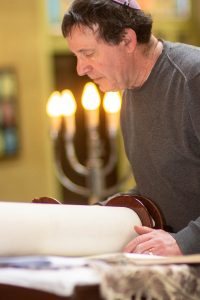Simon Says, January 3, 2020
Thought Provoking Insights by Rabbi Simon Rosenbach
 Last week, Pharaoh says to Joseph, “I hear that you are able to interpret dreams,” and Joseph answers, “God will answer your questions.” In the Joseph story, people need to put their trust in God, but between humans, there is a lot of mistrust going around.
Last week, Pharaoh says to Joseph, “I hear that you are able to interpret dreams,” and Joseph answers, “God will answer your questions.” In the Joseph story, people need to put their trust in God, but between humans, there is a lot of mistrust going around.
As this Parashah, Vayigash, opens, Judah is explaining why his aged father (Jacob) will die when Benjamin does not come home. Many times, Judah alludes to Jacob’s being alive: “we have an aged father,” “and so, should I come to your servant, my father, and the lad [Benjamin] be not with us, for his life is bound to the lad’s, when he saw the lad was not with us, he would die,” and, “for how shall I go up to my father, if the lad be not with us? Let me see not the evil that would find out my father.”
Joseph can not take it anymore, and he reveals himself to his brothers: “I am Joseph.” And he adds, notwithstanding Judah’s references to his living father, “Is my father still alive?”
All of the medieval commentators who are included in the traditional commentary don’t comment on this. Arbarbanel (Isaac ben Judah Arbarbanel), who lived 300 years after Rashi, asks, “Why did Joseph ask, ‘Is my father still alive,’ when Judah made clear two or three times that Jacob was still alive?” Robert Alter suggests that Joseph does not trust Judah’s description of his father, but I see something different.
I have said this many times, but Joseph does not ask, “Is our father alive?” Even though Joseph forgives the brothers in the following verses, he harbors lingering resentment that his brothers sold into slavery. The pronoun “my” signifies that Joseph has special relationship with Jacob.
Additionally, Joseph wants to know whether Jacob still holds a special place in his heart for Joseph, after all these years. “My father” signifies that special relationship, whereas “our father” would equate all of the brothers’ relationship to Jacob.
The lesson to be learned is that a parent is obligated to develop a unique relationship with all of his or her children. The Torah treats favoritism as a given: Sarah loved Isaac more than she loved Ishmael, Rebekah loved Jacob more than she loved Esau, and favoritism moves the story along. Isaac was more deserving to perpetuate the Abrahamic tradition, and Jacob as more deserving to perpetuate the Abrahamic tradition, as well. But in the modern world, we should love each of children equally, but we can love them differently.